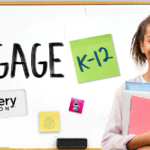The coronavirus has highlighted inequities in education, but it can also be an opportunity for schools and parents to collaborate on solutions.
By Jenni Torres
While we may feel that the coronavirus experience is one we all share, the reality is that many communities (especially those with Black and Brown families) are suffering in tremendously greater ways than other, more privileged, groups. Every day, the experience is changing. Parents may be called on to explain what COVID-19 is one minute and discuss systemic racism the next.
One outcome is evident, though: the inequities that exist in education, healthcare, housing, and other social opportunities have been openly exposed. When it comes to preparing children for kindergarten, the importance of a partnership between families and schools cannot be overstated.
Achieving Family Empowerment
When an extra layer of challenge is added (such as a home language other than English), the partnership must be that much more intentional. Especially in an era such as this one, educators and administrators must be thoughtful designers of solutions that elevate the importance of family empowerment and embed partnerships with caregivers into all aspects of planning and response. This means that all caregivers must have access not only to information but also to channels of two-way communication. Instructional leaders must invest in interpreters and translators so that communication can be shared in all languages of families served and teachers can directly communicate with families in their favored language.
According to research from Hoover-Dempsey and others, empowering families means influencing parental beliefs to foster a sense of advocacy and agency. Families must view the world with the understanding that their child’s learning is partly their responsibility and, most importantly, they must believe that they have the information and agency to make a difference for their child. Families must be given the opportunity to share their hopes and dreams for their children, and schools must listen. Schools must be able to share concrete ways that families can support their children, and provide these details in an easy-to-digest format.
This work requires a true partnership between those designing the back-to-school plan and families in their communities. I think about it on a continuum that begins with family involvement, grows to include family engagement, and then builds upon that success to full family empowerment. (See the graphic below for details.)

Providing Connectivity for All
In these days of distance learning, even the most empowered families can only connect to schools through technology, which highlights another area of inequity. According to 2017 data from the National Telecommunications and Information Administration (NTIA), 3.1 million households (14.1%) with school-aged children have no wired broadband connection at home. Though some of these families likely have a wireless subscription, these data plans aren’t sufficient for extended online learning.
Waterford.org’s own research shows that, as the poverty level of a neighborhood rises, the broadband adoption rate falls precipitously. As COVID-19 requires more schools to transition to online learning, the students who were already the most vulnerable to falling behind will face even more hurdles to keep pace.
Families that sign up for the Waterford Upstart kindergarten readiness program are eligible to receive devices and internet connectivity at no cost. All over the country, local community partners have stepped up to support school districts by providing internet connectivity, support lines, and 1:1 programs offering drive-through pick-up and maintenance locations. Even with these tech tools in place, parents still need social-emotional and academic support before they can help their children get ready for the next school year.
Supporting Parents-Turned-Teachers
As families struggle with supporting their children at home all day, the potential for physical, mental, or emotional overload is great. Before parents can be present for their kids, they need to take care of themselves and acknowledge that, in this extraordinarily stressful time, their mental health is important.
It’s natural for some parents to feel intimidated at the prospect of playing the role of teacher, but for 3- and 4-year-olds, the concepts can be simple. For example, before students learn that there’s an alphabet and every letter is a code that represents a sound, they have to recognize and differentiate sounds. Parents can teach this skill by talking about words that start with the same sound or end in the same sound, reading nursery rhymes, or just noticing letters and words every day. They can practice recognizing letters, naming letters, and then matching the sounds that go with each letter.
To help parents teach their kids literacy, math, and science, Waterford.org offers a number of no-cost resources, including what we call Waterford Early Learning Boosts. Parents who sign up get an email every Monday, Wednesday, and Friday, including a lesson, a video, or a resource created by our team. All of these materials are available in English or Spanish. Parents can also access our YouTube channel, which includes free learning videos that give young learners the opportunity to practice songs about foundational concepts like the alphabet or counting. The goal of all of these resources is the same: to support parents’ role as their children’s first teacher.
Everyone involved in education is facing a great deal of uncertainty right now. The best we can do for our children is to collaborate on educational solutions that offer every family what they need to access the life-changing power of education.
Jenni Torres is a former public school Spanish teacher. She earned her MEd at the Harvard University Graduate School of Education, and is currently in the Educational Policy and Leadership doctoral program at American University. She is the vice president of curriculum at Waterford.org. She can be reached at jennitorres@waterford.org.
The American Consortium for Equity in Education, publisher of the "Equity & Access" journal, celebrates and connects the educators, associations, community partners and industry leaders who are working to solve problems and create a more equitable environment for historically underserved pre K-12 students throughout the United States.
- American Consortium for Equity in Educationhttps://ace-ed.org/author/admin/
- American Consortium for Equity in Educationhttps://ace-ed.org/author/admin/April 23, 2025
- American Consortium for Equity in Educationhttps://ace-ed.org/author/admin/
- American Consortium for Equity in Educationhttps://ace-ed.org/author/admin/







